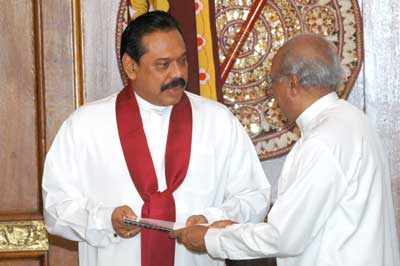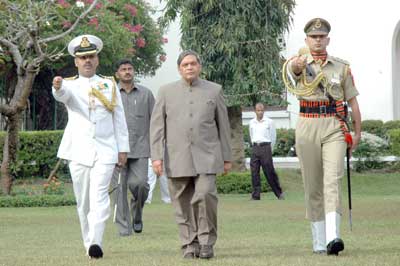
Govt. reverts to the unlucky 13th
A patient suffering from mild ulcer was given a drug. It did not cure him. His condition became worse and turned into cancer. Twenty-one years later, the same patient is administered the same old drug. Is this reasonable? The 76-year-old Veerasingham Anandasangaree, leader of the moderate Tamil United Liberation Front (TULF), raised the question from President Mahinda Rajapaksa last Tuesday. The occasion was a hurriedly summoned meeting of members of the All-Party Representative Committee (APRC) at Temple Trees. The TULF leaders, together with those from two other Tamil parties, which are not members of the APRC, were among others invited. They were from the People's Liberation Organisation of Tamil Eelam (PLOTE) and the Pathmanabha wing of the Eelam People's Revolutionary Liberation Front (EPRLF). Embarrassed by the remarks in front of others, President Rajapaksa parried the question. Yet, Anandasangaree's lament drew a tart response from the Colombo-based Tamil daily Sudar Oli. In an editorial the next day, it said the TULF leader's stance was "absolutely right." "But, why is he hanging on to the doctor who has prescribed that old medicine?" the newspaper asked. He is no longer in Parliament and his role is reduced largely to releasing press statements on Tamil issues. There is little choice for him. Quite apart from old or new drugs, Anandasangaree needs that doctor for all his ills. Tiger guerrillas have placed a heavy price on his head. A team of Army commandos guard him night and day. The fact that he said what he did unhesitatingly despite the constraints reflected a strong moderate viewpoint. In making those remarks, he was alluding to the move to enforce provisions of the 13th Amendment to the 1978 Constitution. These are Government's political proposals to end the 'ethnic conflict'. The 13th Amendment was the by-product of the Indo-Sri Lanka Agreement of July 1987 brokered by late Indian Premier, Rajiv Gandhi. It led to the creation of Provincial Councils where powers devolved fall under a Provincial List and a Concurrent List. The power of the Central Government is categorised in a Reserved List. That Agreement also saw the arrival in Sri Lanka of the Indian Peace Keeping Force (IPKF).
During 18 months when the APRC held 63 sittings, the Government-backed committee was undecided on its recommendations. Last Monday when it met during its 62nd time to discuss putting together a set of political proposals ahead of the deadline (January 23, 2008) set by President Mahinda Rajapaksa, there was a heated debate and more disagreement. It was over a wish by the President that recommendations centre on the 13th Amendment to the Constitution. Should the APRC members simply give in to that wish or formulate their recommendations based on their own discussions in the past one and half years was the issue before the APRC. The news of the indecision, with just two days to go for the deadline, had angered Rajapaksa. He was in a mighty hurry. This is why he summoned the APRC members to 'Temple Trees' for a meeting on Wednesday. This was just ahead of the weekly cabinet meeting. He did not want the January 23 deadline, like all previous ones, to go by default. He insisted that the APRC submit a report to him in keeping with the time limit he set. This newspaper last week quoted the President as saying to the APRC "give me something". That desperate was he. Those who voiced dissent at Monday's meeting were mum when they met Rajapaksa on Wednesday. Yet, Anandasangaree's remarks appeared to underscore the mood among those present. Just hours ahead of the APRC meeting, Rajapaksa met local Editors and Colombo-based Foreign Correspondents at Temple Trees. A news conference ahead of a well laid out meatless Poya Day (Tuesday) lunch saw him make some significant pronouncements. No doubt, some portended policy shifts. Yet most assertions were riddled with contradictions, a facet that is a characteristic of the Government. Here are two significant highlights from what he told the media:
Addressing a ceremony on Thursday at the BMICH where gallantry awards were bestowed on officers and men of the armed forces, President Rajapaksa pledged to continue the offensive against guerrillas "until terrorism is defeated." "The victories gained in the East and the ongoing offensive against the terrorists in the Northern theatre speak volumes of what you are capable of doing. The people of this country have implicit faith that you can eliminate terrorism and liberate this country," he declared. What prompted President Rajapaksa to make these assertions suddenly? In the wake of considerable criticism on the abrogation of the Ceasefire Agreement (CFA) and statements by Government leaders of a military crackdown on the guerrillas, was there pressure on the Government? However, little by little the answers appear to be unfolding. In keeping with President Rajapaksa's wishes, on Wednesday APRC Chairman and cabinet minister (and Lanka Sama Samaja Party stalwart) Tissa Vitharana handed over the report. Within hours it was approved by the Cabinet. The same night envoys of the Donor Co-chairs, Japan, the United States, the European Union and Norway were briefed. On Thursday evening (The Presidential Secretariat, released a four-page document which details out "the APRC's proposals." A preamble to the document said the proposals were for "fully implementing relevant provisions in the present Constitution, in order to achieve maximum and effective devolution of power to the provinces in the short term." Yet the preamble was at variance with what the Secretariat said were proposals of the APRC. Committee Chairman Vitharana's own colleague, the LSSP leader, Batty Weerakoon, called the proposals "an eyewash" and declared it will not be acceptable to Tamils, though it was Vitharana himself who signed the APRC proposals on behalf of the LSSP. The introduction to the Presidential Secretariat document noted that the APRC "was mandated by the President to prepare a set of proposals that would be the basis for a solution to the national question." The APRC was mandated in 2006 to formulate new proposals. It was known then that the 13th Amendment was enshrined in the Constitution 21 years ago. The document quotes the APRC as saying "after 63 sittings over a period of 1 ½ years" a "consensus document is being finalised." Does that mean that the present set of proposals is not a "consensus document?" The implication is clear. Though not spelt out, the APRC wants to make it known that Wednesday's proposals were not its own. There is more. The APRC has said, "it should be possible to hand over to the President" such a "consensus document" only "in the very near future." It has noted that the implementation of such a document "would of course require amendment of the present Constitution, and in some respect of some Articles, approval by the People at a referendum." During what period can this be achieved? Here is the APRC's answer: "This would of course take time, once a favourable climate is established." Such a "favourable climate," though not spelt out, is a reference to the end to the military campaign against Tiger guerrillas. Hence, the APRC observed that, "taking into consideration" its own proposals, it has identified a course of action to "achieve maximum and effective devolution of powers to the provinces in the short term." The APRC has recommended that: "The Government should endeavour to implement the 13th Amendment to the Constitution in respect of legislative, executive and administrative powers, overcoming existing shortcomings." For the Northern Province, the APRC said "the President could" establish an Interim Council in terms of the Constitution. For the East, it has declared that "conditions are conducive" to hold Provincial Council elections. Other APRC recommendations include:
All 14 parties constituting the APRC support the Government except the Sri Lanka Muslim Congress (SLMC) that has since quit. Signing on their behalf was Nizam Kariappar. Though listed as a signatory, the Western People's Front representative Kumar Guruparan did not sign the APRC report. It is quite clear almost the entirety of the APRC proposals is purely administrative. The Government with or without a Presidential decree could have enforced most of them. Thus, the APRC, a Government arm of sorts, playing any role in recommending them is to stultify time-honoured procedures and practices. The only advantage to the Government, however, is that it gives it a handle to say these were recommended by an all-party representative committee. |
|
||||||
|| Front
Page | News | Editorial | Columns | Sports | Plus | Financial
Times | International | Mirror | TV
Times | Funday
Times || |
| |
Reproduction of articles permitted when used without any alterations to contents and the source. |
© Copyright
2008 | Wijeya
Newspapers Ltd.Colombo. Sri Lanka. All Rights Reserved. |

